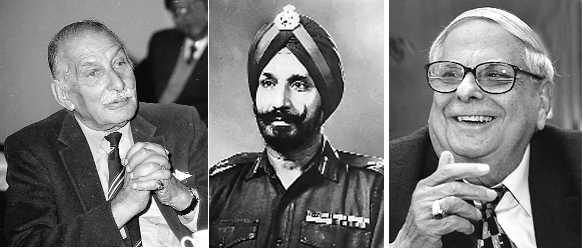Men who mattered
Field Marshal Sam Hormusji Framji Jamshedji Manekshaw (1914-2008) was the Army Chief during the war. This Amritsar-born Parsi will go down in history as India’s most outstanding Army Chief, who led the Army to a brilliant victory that witnessed the largest ever surrender after World War II and the dismemberment of Pakistan within less than a fortnight. Manekshaw, known to be forthright and bordering on being undiplomatic, told Prime Minister Indira Gandhi, in a Cabinet meeting, he needed time until December to prepare for the war and a guaranteed victory. When Indira chose to speak to him in private soon after the meeting, the intrepid General offered to resign. It was not accepted and Manekshaw was given time to prepare. He then went about preparing for the war, which included training and equipping the troops and the Mukti Bahini. Manekshaw, who declined Indira Gandhi’s suggestion that he take the surrender of the East Pakistan forces, had the grace to ask Lt-Gen Jagjit Singh Aurora, who was heading the Eastern Army Command, to not only take the surrender, but to take along his wife since it was such a momentous occasion. Manekshaw was also a recipient of the Padma Vibhushan and Padma Bushan, the country’s second and third highest civilian awards.
Lt-Gen Jagjit Singh Aurora (1916-2005) was the General Officer Commanding-in-Chief of the Army’s Kolkata-based Eastern Command, who quietly directed the Army and the Mukti Bahini from his headquarters during the war, which culminated in the public surrender of his counterpart, Lt-Gen Amir Abdullah Khan Niazi. The moment is captured in the famous picture in which a stoic Aurora is overseeing Niazi signing the surrender document. He was awarded the Padma Bhushan in 1972 and later represented the Akali Dal in Rajya Sabha. Well before his death, he handed over the uniform that he wore on the day of taking the surrender along with Niazi’s flag to his regiment, the Punjab Regiment, and Niazi’s revolver to Indian Military Academy.
Lt-Gen Jack Farj Rafael Jacob (1923-2016) was Lt-Gen Aurora’s number 2 as Chief of Staff of the Eastern Command. He hailed from a long line of Baghdadi Jews, who had moved to India from Iraq in the middle of the 18th century. Jacob played a pivotal role in negotiating the historic surrender of the Pakistani troops and in meticulously preparing for the war. In his seminal book Birth of a Nation: Surrender at Dacca, Jacob also revealed how he took the decision to race to capture Dacca (now Dhaka), the centre of gravity of the East Pakistan army, which inexplicably was never the focus in Manekshaw’s operational instructions. Eventually, 93,000 Pakistanis surrendered even though there were only 3,000 Indian soldiers pitted against 26,000 Pakistani troops in Dacca at that time. Jacob was later made Governor of Goa followed by that of Punjab during the Vajpayee government.
— Dinesh Kumar
Unlock Exclusive Insights with The Tribune Premium
Take your experience further with Premium access.
Thought-provoking Opinions, Expert Analysis, In-depth Insights and other Member Only Benefits
Already a Member? Sign In Now










